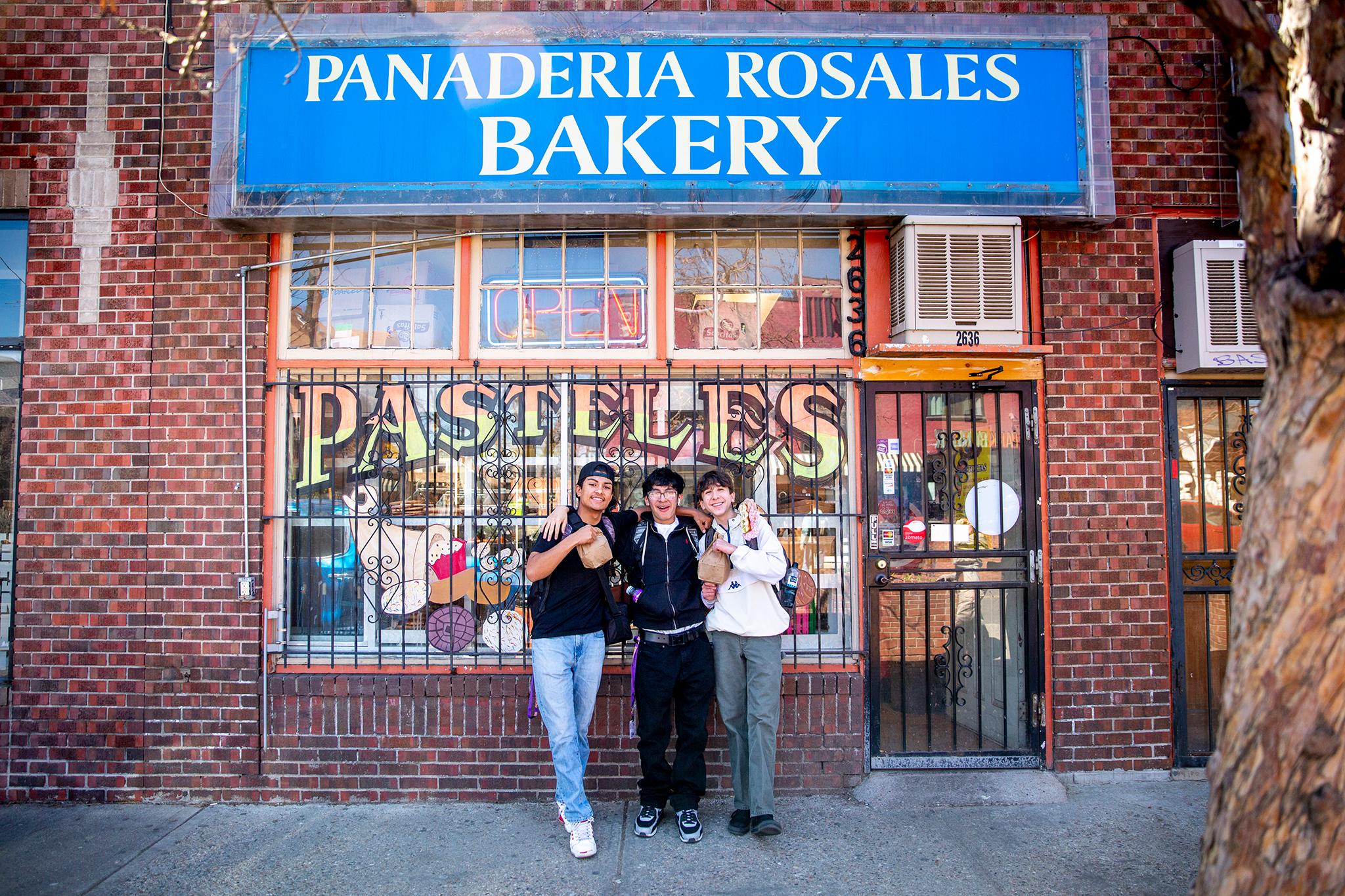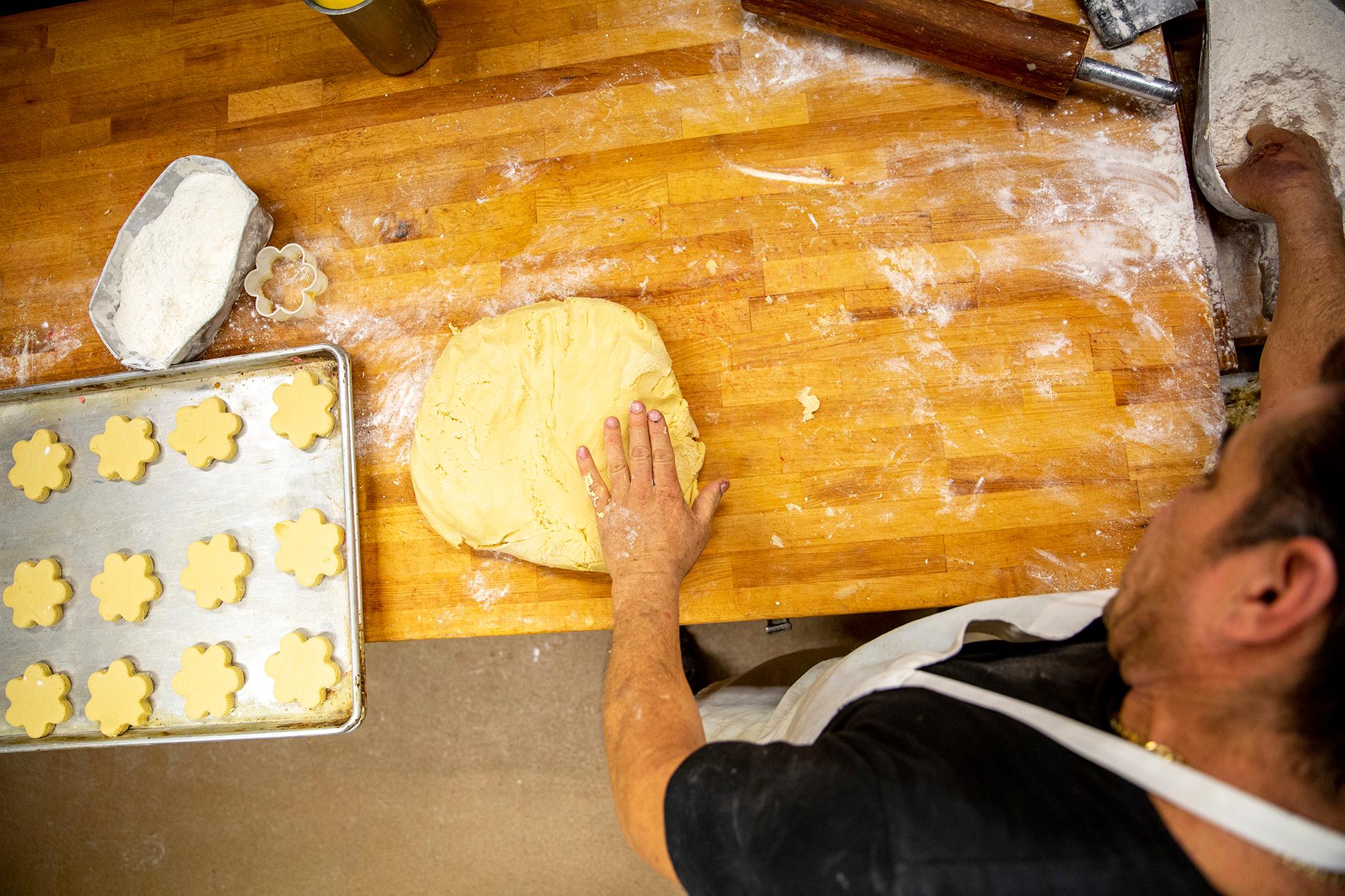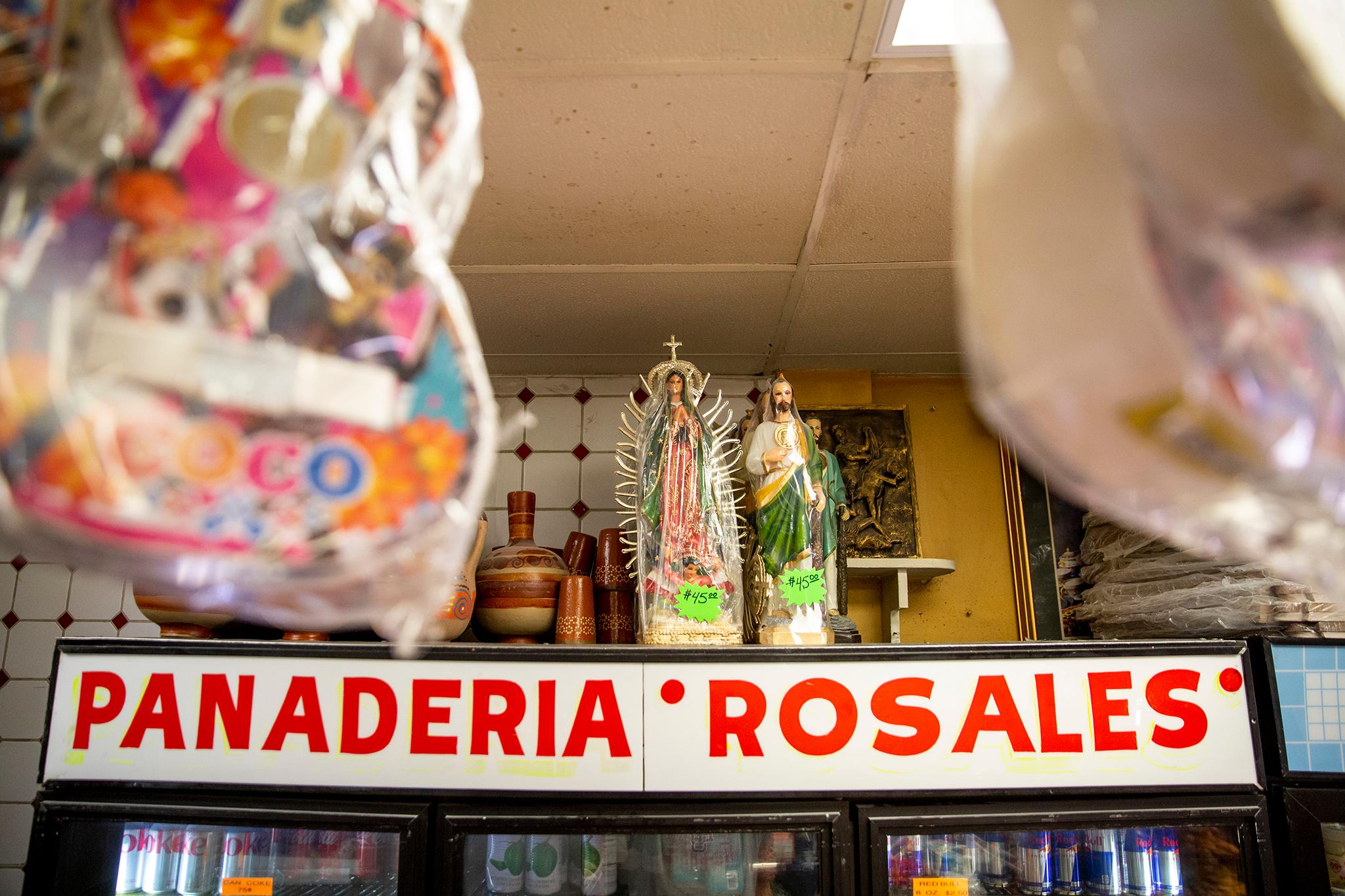Inside Panadería Rosales, silver tongs clang against old aluminum trays as customers choose and take pan dulce and other fresh pastries from the glass display. They then make their way to the small register at the back of the shop.
One by one, Laura Lechuga, owner of the bakery, tosses each sugary creation into a white paper bag, spilling bread crumbs and whispering to herself numbers as they go in, counting up to the $5 minimum charge for credit card purchases.
A sugary fragrance from the jelly-layered, powdered, rainbow-sprinkled options wafts through the air at the old North Denver establishment located at 2636 W. 32 Ave. A group of chattering North High School students form a line around the Takis stand at lunch time.
Colorful piñatas, which may one day be destroyed by children at a birthday party, hang from the ceiling just high enough so visitors don't knock their heads against them.

Lechuga's father, Jose Rosales, opened Panaderia Rosales in 1976.
It was one of the first Mexican bakeries in Denver when it first opened then. Lechuga's father first moved to Denver because of violence in Ciudad Juarez.
"My father was a businessman," Lechuga said. "He always thought about advancing, being better. Someone came to my father's bakery in Juarez and offered him a job in Denver. He came and worked here for a season and would visit us in Juarez."
Lechuga moved here with her father and the rest of her family from Ciudad Juarez at the age of 10.
"It was quite difficult for me," Lechuga said, "I always liked and stood out in school. Coming here and not knowing anything was really difficult...really difficult."
With the entire family now in Denver, dad baked the bread while her mom and her two sisters helped around however they could.
"No one had to tell me anything because I already knew what to do. I grew up in the bakery," Lechuga said. "My job included helping my dad take out things from the oven, taking out trays, and always attending to customers."
Lechuga would graduate from North High School, and when her father passed in 1992, she became owner.
"I'm grateful my father took me everywhere because that's how I learned how to run the business. Otherwise we would have closed it when he passed," Lechuga said. "My sisters didn't want to do it. My mother couldn't. I've run [the bakery] for 30 years, but my dad knew a lot more than I did. Sometimes it feels like I'm losing it, I don't know."
Lechuga owns the property herself, though it didn't come easily. Before being able to take over it, she had to overcome infighting between half-brothers and a nephew in the process, and because her father died without a will, she had to go to probate court and buy the building.

"¡Oh muchísimo! Muchísimo."
"Oh very much! Very much," Lechuga said when asked how the neighborhood has changed over the years. "I think that of all the blocks on (32nd Ave), perhaps this block has remained the most original. Almost all of the other buildings have been renovated, knocked down or they're doing something to them."
Despite the gentrification around it, the panadería has made an intentional effort to preserve the quality of its bread and its own cultural identity.
"We try to make the bread that we make reflect Mexico...when people come in here they say 'it smells like a bakery, it looks like a bakery' because we follow Mexican traditions," Lechuga said.

Conchas and bolillos are some of the most popular breads in Mexico, and they are also fan favorites at Rosales. Bolillos are the reason that people like Jesus Guevara have been coming to Panadería Rosales for more than 40 years.
"The [bakery] has been the same as when I first came. I come to buy bolillos," Guevara said, holding up his bag of bread, double-bagged for support. "It's the best. Mexican style completely."
He said he comes every two to three weeks to buy bolillos. Will this bag of bolillos last two to three weeks?
"No! These bolillos will be finished tomorrow!" Guevara said and laughed.
Faithful customers of the bakery even notice when the bread tastes different.
"La gente nota!"
"People notice!" Lechuga said. "If there is any change, they tell us right away. I once came to pay $150 for a box of 15 dozen eggs, but we bought the largest egg, the jumbo. If we don't want to lower the quality, we have to use the same ingredients." (Egg prices skyrocketed in January due to the avian flu.)
Marranitos, Mexican pig-shaped gingerbread, are also one of Lechuga's best sellers. The bakers start working on them at around 5 a.m. every day, and the bakery usually sells about 300 every day, according to Lechuga.
"Si no hay, me regañan," Lechuga said in reference to her early morning customers, unhappy when the marranitos aren't in stock. Some customers are willing to wait upwards of 15 minutes for fresh Marranitos.
Lechuga said many of her surrounding clients and potential clients are white, some of whom aren't necessarily inclined to buy from Rosales.
"They might not be interested in coming here, but since their kids are asking them, they come. And once you enter, it's a different experience. They try one thing and little by little they try new things that they like."
Of his new neighbors, customer Guevara said, "Es puuuro gringo ahorita."
He lives six blocks north of the bakery, on 38th Ave. "[The neighborhood] used to be Mexican. Everyone sold homes, they left and just gringos arrived. They remodeled the entire area, buildings, apartments. Everyone knows me and I know them. It doesn't bother me at all."

Oscar Noe Ruiz Diaz is a construction worker near Colfax and Speer that walked in just before the lunch rush with his colleagues. He's "150%" Mexican from Michoacán and has lived in Colorado for more than 20 years.
"We come two to three times a week. We like the carnitas and the bread. I've been coming here for about five years," Diaz said. "We like coming here and the price is really affordable."
Though customers like Diaz know what they're buying, Lechuga said it can sometimes be difficult to describe the taste of her pan dulce to new customers.
"How do you describe a chocolate chip cookie to someone who has never seen one? It's sugar! It has chocolate. That's it! I don't know how to explain to someone what it tastes like," Lechuga said. "Only the palate will tell you what you like."
Though Lechuga has stayed true to the bakery's own traditions, she said she would like to make renovations and other updates to the building. She wants a higher ceiling, new flooring, and would like to install new heating and cooling systems.
So far, she hasn't found the right contractor to work with.
"We're still very old here," Lechuga said. "I would like to renovate the bakery, but what stops me is that I don't want someone to take advantage of me. I don't know who to trust exactly. I work too hard for my money to throw it away."

North High Students often pack out the bakery during lunch hours for the cheap tortas.
"I got a torta de carnitas," said Johnathan Romero, a North High School freshman, scarfing down big bites of the sandwich.
"Carnitas, always carnitas," his friend Mateo Limon said. "It's nice because most students at North [High School] are Hispanic, it's just kind of nice to go to some place that serves nice food and cheap."
Joaquin Hernandez, another North student, said the bakery matters because it feels like an original part of Denver's culture.
"Denver's a more Chicano-based community, especially this northern side and west side as well. More white people have been coming in, gentrifying it," Hernandez said. "I feel like it's important that we keep these kinds of stores here to keep supporting the Chicano workers and just people that have been living here for years."

Lilly Cervantes, Alyssa Griego and Pedro Hernandez are also freshmen at North High School.
"I like coming here because this is like the only place I know in the area that has real Mexican treats," Cervantes said. "Everybody knows that this place is here. Everybody knows about it."
Griego chimed in to say that she visits the bakery "because it's just like a really calm energy. Like it's hot in there, but it smells really nice. It's just a really comforting place."
Lechuga herself finds comfort in her memories of working at the bakery with her family and learning from her father.
"It was nice to bake bread as a family all day. And I don't know if everyone had a father like him, but I loved mine."
And of course, she cherishes the neighborhood around her.

"No somos perfectos de ninguna manera, pero hemos tratado de mantener la panadería en un buen lugar, para la comunidad, porque de ellos vivimos."
"We are not perfect by any means, but we have tried to keep the bakery in good shape, for the community, because they are how we make our living," Lechuga said.
Editor's note: This article has been corrected to attribute a quote to North High School student Joaquin Hernandez.













